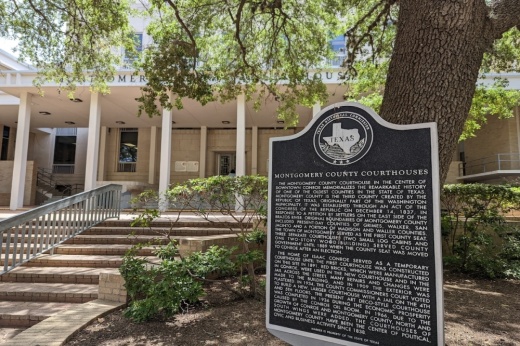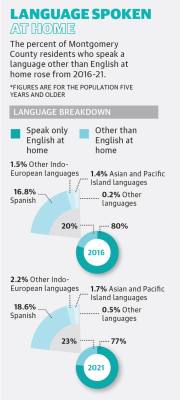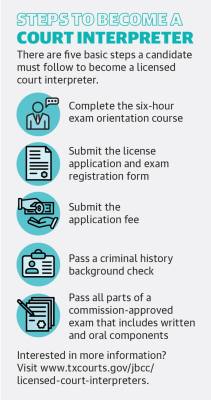Previously, court interpreters were paid $65 an hour for the first two days working a jury trial, according to Wendy Little, the county’s director of the office of court administration.
Following two full days of $650 per day, pay for court interpreters goes back to $65 per hour, Little said.
“In order to get [court interpreters] to come to up here, we had to say, ‘Look, if you’re going to come to Montgomery County, we’ll at least guarantee you these first two days of trial—10 hours a day,” Little said.
Paying interpreters
Court interpreters, licensed in various languages such as Spanish, Vietnamese and Arabic, are used when needed in court proceedings such as civil and criminal trials, depositions and arraignments.
If an interpreter cannot be found, a case is unable to proceed.
Little said she estimates interpreters are needed for about two or three arrests daily on average of about 50 arrests.
She said the pay change reduces the cost for the county, as pay rates previously reached as high as $100 per hour, because the county was unable to secure interpreters at the negotiated rate.
Little said the jury trial pay in Harris County is $65 an hour, and, until the pay change, it did not make economic sense for court interpreters to drive to Montgomery County to receive the same pay they would in Harris County. “After I spoke with [County Judge Mark] Keough, and he approved doing the $650 per day, I had seven or eight interpreters all say, ‘For that, I’ll come north and do your trial,’” Little said.
In Harris County, there are 13 full-time Spanish interpreters for its courts, Richard Woods, the district courts administrator for the county, said in a Jan. 26 email. The county also has three language service agencies mainly used for finding interpreters familiar in languages other than Spanish.
Meanwhile, Harris County’s daily rate for court interpreters is $55 hourly with a max rate per day of $330 while the jury trial rate is $65 hourly with a max rate per day of $390.
A need for interpreters
Little said Harris County has close to 100 interpreters living in the area, while Montgomery County has 10.
"Our 10 can’t necessarily handle our workload and all of the small surrounding counties that also need them,” Little said.
Montgomery County does have one full-time court interpreter on staff, Little said.
“We also have contract interpreters come in when we know that we’re going to have more work than just one interpreter can handle,” Little said. “We have 14 judges on the bench in Montgomery County, and they all could end up needing interpreters on •one day.”
County Judge Kathleen Hamilton, who presides over the 359th District Court, said the courts balance the cases that need interpreters with those that do not need interpreters.
“We have to wait our turn, and so sometimes that means we do other cases first and just hold onto those, and when we see the interpreter come in, we usually stop whatever we’re doing as soon as we can and take that interpreter’s case first so they can scoot on their way to help somebody else,” Hamilton said.
To qualify to be a court interpreter, people are required to complete a six-hour orientation course, pass a criminal history background check, and pass both a written and oral exam, according to the Texas Judicial Branch Certification Commission.
“The misconception is that, ‘Oh, it’s just somebody else who speaks Spanish,’” Little said. “It is a whole lot more complicated than that to be a certified interpreter for court proceedings.”
In Harris County, Vietnamese was the language interpretation most requested by district courts, at 23.3% of the requests, with Spanish following behind at 21.7%, according to 2022 data provided by Woods from MasterWord Services, one of the language service agencies the county uses.
Working as a court interpreter
Jackie Serrano, who is a licensed court interpreter in Spanish, got her certification in 2017.
Serrano said in an interview that her dad, an attorney, suggested she become a court interpreter after her kids were a bit older.
Serrano said she did a lot of online courses and practice before taking the court interpreter’s test.
“There was some sort of influence between my dad being an attorney, both my best friends being attorneys, my husband’s being an attorney, my brother being an attorney,” Serrano said. “I’ve been surrounded by juries my whole life, so that gave me a little bit of insight into how courtrooms work and a lot of the terminology, so that was a bit of help for me. But it was a lot of hard work, intensive hard work self-teaching myself.”
Now a full-time court interpreter, Serrano mainly works in Montgomery County.
Earlier in her career as an interpreter, Serrano said she did a lot of immigration court and served clients that were from different countries in Latin America.
“You have to have a little bit of knowledge of the culture in each country because in each country, it is different,” Serrano said. “Even though the language is the same, some words may not mean the same thing in two different countries.”
Serrano said court interpreters are an important part of the judicial system.
“Without interpreters, courts kind of come to a halt,” Serrano said. “They can’t keep going in cases where they do need to have an interpreter. If there’s no interpreter available, they simply can’t hear the cases. So our role is important.”
Steps to become a court interpreter
There are five basic steps a candidate must follow to become a licensed court interpreter.
1. Complete the six-hour exam orientation course
2. Submit the license application and exam registration form
3. Submit the application fee
4. Pass a criminal history background check
5. Pass all parts of a commission-approved exam that includes written and oral components
Interested in more information? Visit www.txcourts.gov/jbcc/licensed-court-interpreters







